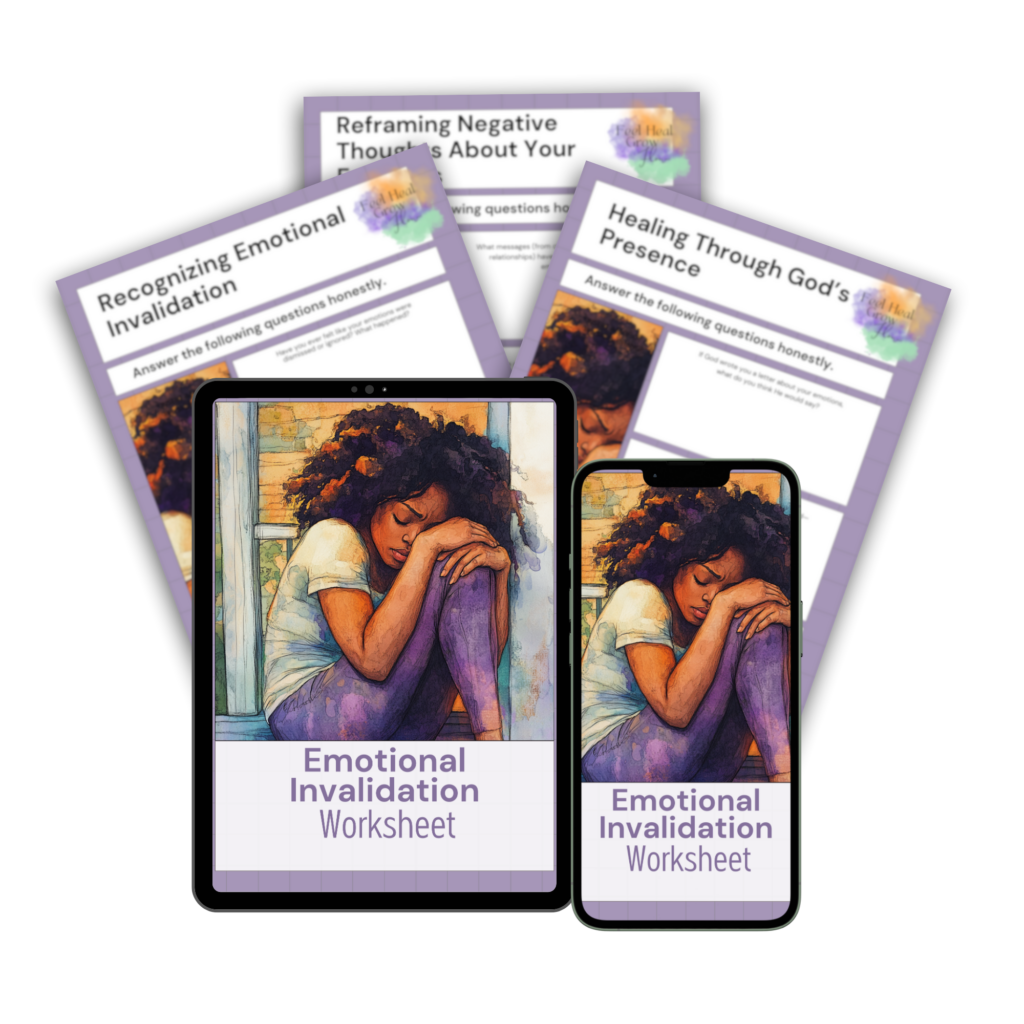
Have You Ever Felt Like Your Feelings Didn’t Matter?
You share your heart, only to be met with “You’re overreacting,” or “Just pray about it and move on.” It stings, doesn’t it? That’s emotional invalidation—when your feelings, thoughts, or experiences are dismissed, ignored, or minimized. And while others may not always intend harm, the impact can be deep, leaving wounds that affect self-worth, relationships, and even faith.
The good news? God never invalidates your emotions. He sees you, He hears you, and He cares about every tear (Psalm 56:8).
What is Emotional Invalidation?
Emotional invalidation happens when someone disregards or diminishes your emotions, making you feel like your feelings are wrong, exaggerated, or unimportant. It can show up in different ways:
Minimizing – “It’s not that bad.”
Dismissing – “You’re too sensitive.”
Comparing – “Other people have it worse.”
Shaming – “You should be stronger than this.”
Spiritualizing Without Compassion – “Just have more faith.”
Even well-meaning people can invalidate emotions when they rush to fix or spiritualize things instead of listening.
How Emotional Invalidation Affects You
When you’re constantly invalidated, it can make you:
- Question whether your feelings are real or “valid.”
- Struggle to express yourself for fear of rejection.
- Feel unseen and unheard, even by those closest to you.
- Suppress emotions, leading to stress, anxiety, or resentment.
But here’s the truth: Your emotions are real, and God cares about them. In Scripture, we see Jesus validate emotions—He wept (John 11:35), showed righteous anger (Mark 3:5), and comforted the brokenhearted (Psalm 34:18).
What Does the Bible Say About Your Emotions?
God doesn’t dismiss emotions. He invites us to bring them to Him. Here are three biblical truths about emotions:
1. God Acknowledges Your Pain
“The Lord is near to the brokenhearted and saves the crushed in spirit.” — Psalm 34:18
If God cares about your pain, so should you.
2. Jesus Acknowledges the Widow’s Grief and Responds with Compassion
“When the Lord saw her, He had compassion on her and said to her, ‘Do not weep.’ Then He came up and touched the bier, and the bearers stood still. And He said, ‘Young man, I say to you, arise.’” — Luke 7:13-14
Jesus doesn’t overlook our emotions. He meets us in them, offering both compassion and divine intervention.
3. God Gives Space for Processing Emotions
“Pour out your heart before him; God is a refuge for us.” — Psalm 62:8
You don’t have to suppress your feelings to be strong in faith.
How to Heal from Emotional Invalidation
If you’ve experienced emotional invalidation, you’re not alone. Here’s how you can heal:
1. Validate Yourself Through God’s Truth
Instead of seeking validation from others, remind yourself:
- “My feelings matter because God created me with emotions.”
- “I don’t have to justify how I feel to be worthy of love and respect.”
- “God sees my pain, and that is enough.”
2. Find Safe Spaces for Emotional Expression
Seek relationships where you feel heard and valued. This might be a trusted friend, therapist, or support group.
3. Set Boundaries with Those Who Invalidate
It’s okay to limit conversations with people who repeatedly dismiss your feelings. You don’t have to tolerate constant invalidation.
4. Turn to God for Emotional Healing
When others don’t understand your emotions, God always does. Take time to pray and journal about what you’re feeling.
Breathing Prayer Exercise:
Inhale: God, You understand my heart.
Exhale: I release the need for human validation.
5. Learn to Respond Instead of React
When someone invalidates you, instead of absorbing the hurt, respond with grace and confidence:
- “I know you may not understand, but this is important to me.”
- “I don’t need a solution—just a listening ear.”
- “I’d appreciate it if my feelings weren’t dismissed.”
Your Emotions Matter to God
If you’ve ever felt dismissed, unseen, or unheard—know this: God sees you. He doesn’t rush you past your emotions. He meets you in them, comforts you, and offers healing.
You don’t have to silence yourself to be strong. You don’t have to prove your emotions are valid—they already are.
I’d love to hear from you: Have you ever experienced emotional invalidation? How did you handle it?
Bonus Download:
Grab my FREE Emotional Validation Journal Prompts to help you process and honor your emotions in a way that aligns with God’s truth!






